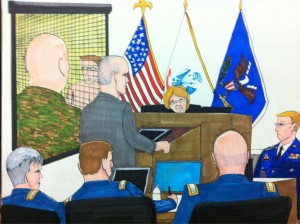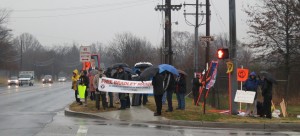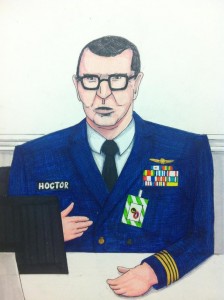PFC Bradley Manning testified today to explain the brutal detention conditions he suffered at the Quantico Marine brig, officials deceiving him regarding how to change those conditions, and relaxed conditions at Ft. Leavenworth. See day 1 notes and day 2 notes here.
By Nathan Fuller, Bradley Manning Support Network. November 29, 2012.

Courtroom scene when David Coombs played a Quantico video. Sketch by Clark Stoeckley.
Today PFC Bradley Manning took the stand to give much-anticipated testimony about his detention conditions in Kuwait, at the Quantico Marine brig, and at Ft. Leavenworth, explaining that he endured harsh and needlessly restrictive conditions at Quantico, yet was put in much less constrictive custody as soon as he was transferred to Ft. Leavenworth. Furthermore, Quantico’s brig counselor, Gunnery Sergeant Blenis, misled Bradley about who was responsible for his abusive conditions.
Bradley answered questions from defense lawyer David Coombs for several hours in Ft. Meade, MD, for the defense’s motion to dismiss charges based on unlawful pretrial punishment. First he explained his traumatic experience in Kuwait, where he was brought to a military tent, forced to stay in a metal cell that he said felt like an “animal cage,” and was so disoriented and isolated that he felt suicidal. He thought he was going to die in Kuwait, felt “trapped” because no one told him what was happening to him, and when he was transferred he figured he would be sent to Guantanamo Bay.
When transferred to Quantico on July 29, 2010, Bradley was immediately put on Suicide Risk watch, which is effectively solitary confinement with guards checking on him every five minutes. Brig psychiatrists recommended that Bradley’s detention status be reduced to Prevention of Injury (POI) watch in seven days, but Quantico officials didn’t change the status for nearly two weeks. On Suicide Risk, Bradley saw only 20 minutes of natural light each day, interacted with almost no one else, and became increasingly anxious.
For the remainder of his nine-month stay, Bradley was then held on restrictive POI watch, which he described as nearly the same as Suicide Risk, though he was a model detainee and psychiatrists confirmed that he posed no threat to himself or others. Suicide Risk and POI watch aren’t technically referred to as ‘solitary confinement,’ but Bradley was segregated from the rest of the Quantico population. Seeing only the reflection of sunlight down the hall, Bradley was largely cut off from the world. The rooms adjacent to his were empty, and he wasn’t allowed to speak loud enough to communicate with the detainees much further down the hall.
On Suicide Risk, Bradley had to wear a coarse smock and sleep on a tiny uncomfortable mattress. He was never given a pillow during his entire time at Quantico, regardless of his custody status. Throughout his time there, a fluorescent light blasted into Bradley’s six-by-eight-foot cell, 24 hours a day. When he turned his face from the light when trying to sleep, brig officials woke him up to “make sure he was okay.” On Suicide Risk, this happened two or three times every single night, and it still happened a few times a week on POI.
Blenis deceives Manning about his conditions
More and more stressed out, Bradley desperately wanted to be removed from POI watch. Each time he met with brig psychiatrists and during most of his interactions with the brig counselor, he asked what he could do to get his status reduced. GYSGT Blenis, who met with Bradley at least once a week, and who frequently gave him an ‘A’ grade as a detainee, told Bradley that he was perplexed as to why the psychiatrists kept recommending he stay on POI status. However, brig psychiatrist Cpt. Hoctor testified yesterday that the exact opposite was true: Cpt. Hoctor recommended almost every single week that Bradley be removed from POI watch, and was exasperated that Quantico officials fully ignored his advice. He believed “they had made up their mind” to keep Bradley in isolated confinement.
Cpt. Hoctor told Bradley that he recommended normal treatment, and upon hearing the conflicting messages Bradley didn’t know whom to trust. Since GYSGT Blenis and other Quantico officials continued to praise him as a model detainee, with one of them saying he wished he had “100 PFC Mannings,” he thought Cpt. Hoctor might be deceiving him.
Guards provoke Manning, officials remove his clothing
The confusion, coupled with the repeated refusal of brig officials to hear his arguments for ending the restrictive POI watch, led Bradley to become withdrawn and to consider alternative channels to remedy his situation, such as through his defense counsel.
A day after supporters of Bradley Manning protested at Quantico on January 17, 2011, Bradley testified that staff guards handled him gruffly, were curt with their orders, and then put him in an intentionally confusing “shark attack environment” in which they barked contradicting orders at him and yelled at him when he didn’t follow properly. Bradley became panicked, fell down in the recreation hall, and said he “became emotional.”
Bradley continued with his recreation time as usual after the incident, but when he returned to his cell, he knew something was wrong. Guards were whispering outside his cell, officials were passing by and gathering outside, and then Brig Officer in Charge Averhart entered his cell to yell at Bradley.
The two discussed the situation, seemed to relax, and then Bradley brought up his POI status while he had the chance. Averhart felt “insulted” and “furious” that Bradley would broach the subject, and he reminded Bradley of his rank. Averhart left the cell, and GYSGT Blenis asked Bradley to remove his clothes and informed him that he’d be back on Suicide Risk.
Coombs then played two short videos that Quantico officials took of GYSGT Blenis’s response, in which he told Bradley, “We’re not outside rules and regulations with anything we’re doing,” when Bradley countered, “But I’m not a suicide risk.”
Bradley said that psychiatrists recommended he be removed from POI, and GYSGT Blenis responded, “Who sees you every day?” GYSGT Blenis said that Cpt. Hoctor’s was “just a recommendation,” and that “other factors” had to be considered.
Bradley was forced to remain nude, except for his boxers during the day, for the rest of his time at Quantico.
Transitioning to life at Ft. Leavenworth
Finally, Bradley testified about his transfer to Ft. Leavenworth on April 20, 2011. After the multi-day ‘reception process,’ Bradley was not deemed harmful to himself, and was immediately placed in medium security. Bradley was shocked not to be in metal restraints, and felt awkward. He was expecting to be placed in the same status as in Quantico, and said he thought they’d “bring the hammer down.”
At Ft. Leavenworth, which he called a “huge upgrade,” Bradley was given his clothes back, allowed to have basic toiletries he wasn’t allowed to have in Quantico, and was free to use the library, gym, common area, and word processor just about whenever he pleased.
Leavenworth commander confirms Bradley didn’t need POI
Just before Bradley’s testimony, the defense called Ft. Leavenworth’s Garrison Commander Lt. Col. Dawn Hilton telephonically to explain the processes at Ft. Leavenworth to take in detainees, assess their mental health, and determine their custody status.
Lt. Col. Hilton said that she never overruled a mental health professional’s advice regarding Suicide Risk. In fact, she said she made it a priority to try to get detainees
off of Suicide Risk, knowing that it affects their mental health, and if a detainee is not off of Suicide Risk within 48 hours, she works to get the detainee into a psychiatric ward. The longest she’s ever had a detainee on Suicide Risk was seven days – an extreme case, and an extreme contrast with Bradley’s several months on that status.
Lt. Col. Hilton said Bradley has never appeared at risk of potentially harming himself, and that he’s been on medium security since his arrival.
Tomorrow, the government will cross-examine Bradley, Coombs will re-direct follow-up questions, and Judge Denise Lind will ask him her own questions.





